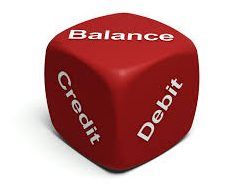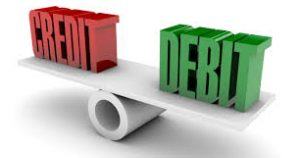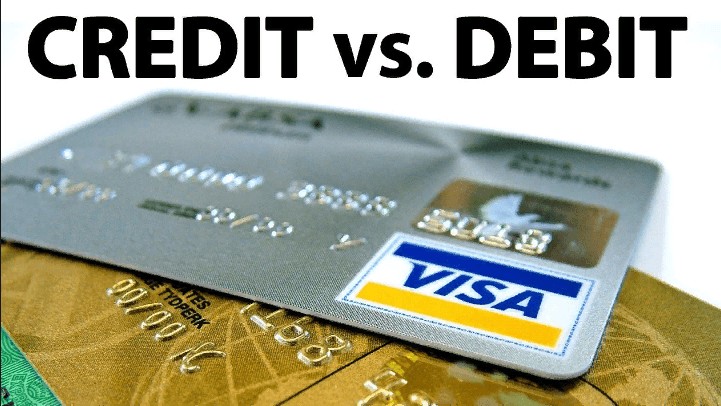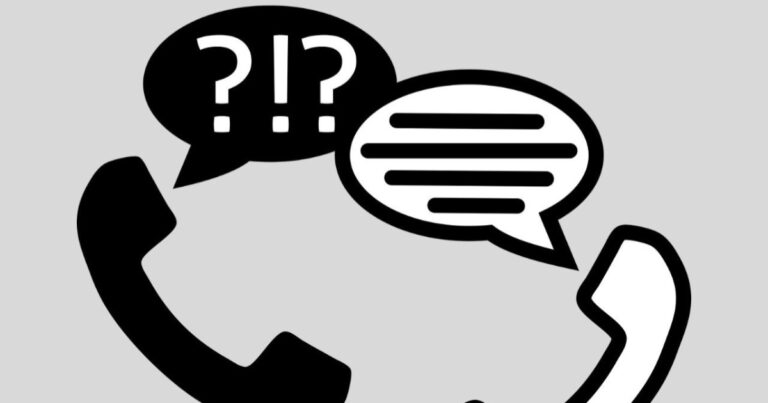Credit and debit card offers more than a way to access money without having to carry around cash or a bulky checkbook. Understanding the difference between a debit card credit card allows you to make wise financial decisions.
Credit and debit card are accepted at the same places. Debit cards all carry the symbol of one of the major types of credit cards on them and can be used anywhere that credit cards are accepted. They both offer convenience. The fundamental difference between a debit card and a credit card account is where the cards pull the money.
A debit card takes it from your banking account and a credit card charges it to your line of credit.
What is Credit Card:
A credit card allows you to loan a small amount of money from a local merchant. You use this card for basic transactions. The bank then charges you the interest on your purchases, but usually, you have a grace period of about thirty days before interest is charged. Credit cards have a very high-interest rate and are considered a rotating credit facility that you can use once you have paid off. Credit card balance and payment history may affect your credit score.
- A credit card is the credit line that you can access using your card.
- In general, you must sign these purchases (exceptions may be on refueling pumps or a small number of passes through the window).
- If you do not pay within thirty days, you will pay the interest you paid for the purchase.
What is Debit Card:
Debit cards offer the ease of credit but work in different ways. Debit cards withdraw money directly from your checking account at the time of your purchase. They do this by placing a hold on the purchase amount. The merchant then sends the transaction to their bank and transfers to the merchant account. This may take a few days and may hold down until the transaction is completed. For this reason, it is important to keep your checking account operational in order to ensure that you do not accidentally overdraw your account. Debit cards can do this.
You will use your debit card with a PIN at a store or ATM. However, you can also use your debit card at most merchants without the need for a PIN, you just sign the receipt like with a credit card.
- A debit card is bound directly to your checking account.
- It can be used where a credit card can be used.
- Commonly, you will use your PIN to complete the transactions.


Credit and Debit Card Comparison chart
|
Credit Card Vs. Debit Card |
||
| Credit Card | Debit Card | |
| Credit cards allow you to loan a small amount of money from a local merchant. You use this card for basic transactions. | Debit cards withdraw money directly from your checking account at the time of your purchase. They do this by placing a hold on the purchase amount. | |
| Connection | Not connected to checking account | Checking or Savings Account |
| Monthly Billing | Yes | No |
| Process | Slightly difficult, varying on credit score and other details. | Comfortable, with basically no hurdle to receiving a debit card. |
| Payment Limit | Credit limit set by the credit issuer. Limits increase or stay the same over time as a borrower’s creditworthiness changes. | Though much is in the bank account connected to the card. |
| Interest Charged | If a credit card bill is not paid in full, interest is charged on the outstanding balance. The interest rate is usually very high. | No interest is charged because no money is loaned. |
| Security | Credit cards in the U.S. are not very secure in and of themselves because many still use dated card security technology. But, customers are not held responsible for this poor security. | PIN makes them secure so long as no one steals the card number and PIN, and as long as you don’t lose the card itself. If the details of a card are hacked, debit cards are very insecure. |
| Fraud Liability | Small. Rarely held liable for fraudulent activity. If you are, you are only held liable for a maximum of $50. | High. If someone steals your card and makes purchases, that money is removed from your bank account. Inspecting this damage takes time. Waiting for more to report the fraud, the more you will be held liable for your own losses. |
| Credit History | Responsible credit card usage and payment can improve one’s credit rating. Credit cards normally report account activity to at least one of the three major credit units on a monthly basis. | Does not affect credit history. |
| Overdraw Fees | Low. Some credit card companies allow overdrawing amount over the maximum credit line with a fee. | High “overdraft” fees. Possible to overdraw amount over the account limit. |
| PIN | In the U.S., this is uncommon, but PINs are being phased in. | Usually |
Summarized Credit and Debit Card:
credit card allows you to loan a small amount of money from a local merchant. You use this card for basic transactions.
Debit cards withdraw money directly from your checking account at the time of your purchase. They do this by placing a hold on the purchase amount.




